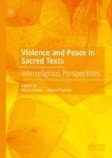Search
Search Results
-
The Secularism Paradox of Interreligious Relations and International Relations
This chapter attempts to address the role of secularism in the rise of the modern nation-state. It challenges the claim that secularism’s so-called...
-
Experiences with Violence: Studying Sacred Text in Interreligious Dialogue
Practitioners of interreligious dialogue are drawn to dialogue because of the matters of life and death that are crucial to them. The International...
-
The Conditions of Hospitality in Interreligious Encounter
These are not hospitable times. There is thus good reason for examining the grounds and scope of interreligious encounters. This essay analyzes...
-
Towards Interreligious Spiritual Hospitality: A Lutheran Perspective
When we reflect on the role of the majority of humanity and its relationship with nature it is almost and always more of dependency and consumption....
-
Reciprocal Illumination and the Discovery of Fractal Patterns in Religious Diversity
This essay presents Arvind Sharma’s concept of “reciprocal illumination” as an innovative defense of interreligious comparison, showing that the...
-
Methodological Considerations for Interreligious Theological Engagement: New Directions in Comparative-Dialogical Theology
This chapter offers a methodological framework for Interreligious Theological Reflection (ITR), a new direction in Comparative Theology (CT), which...
-
Does Religious Self-Understanding Impede Interreligious Dialogue?
In chapter five, I first respond to my critic’s query whether it is logically possible to say that mutual understanding is the primary aim of...
-
Mutual Understanding as Condition and Aim of Interreligious Dialogue
The focus of my critical attention in the fourth chapter is on the concept of mutual understanding: First, what does it mean to understand an object?...
-
Mysticism as a Basis of Interreligious Dialogue: God-Centeredness
The focus of my attention in this chapter is God-centeredness. Some theologians and philosophers have argued that this orientation cannot be a...
-
Religion and Sustainability: Interreligious Resources, Interdisciplinary Responses Intersection of Sustainability Studies and Religion, Theology, Philosophy
This volume brings sustainability studies into creative and constructive conversation with actions, practices, and worldviews from religion and...
-
Mutual Respect as a Condition of Interreligious Dialogue
In this chapter, I discuss in some detail the concept of mutual respect in interreligious dialogue. I argue that the subject of the conversation in...
-
Interreligious Learning and Intersectionality
Interreligious learning is important because of the plurality of religious traditions in many parts of the globalized world. This article uses an...
-
From Porous Borders to Cosmopolitan Horizons: Beyond Interreligious Dialogue and Multiple Belonging
The chapter brings together the North and the South in promoting religious cosmopolitanism. It is something that goes beyond interreligious dialogue...
-
“Reciprocal Illumination” of Hinduism, Human Rights, and the Comparative Study of Religion: Arvind Sharma’s Contributions
Arvind Sharma has made immensely significant contributions in the fields of both comparative religion and the study of Hinduism through his...
-
Meaningful Interpersonal Contact: Interreligious Dialogue as a Response to the Cognitive and Social Dynamics of Bias
Social and religious prejudices are a product of both “nature” and “nurture” and they have social and cognitive foundations, which are both...
-
Ecumenical and Interreligious Dialogue at Vatican II and in Its Aftermath: Charting the Way Forward
The Second Vatican Ecumenical Council (1962–1965) is noted for having instituted a twofold dialogue—dialogue among the Christian Churches and...
-
A Most Uncommon Task: Arvind Sharma and the Construction of Hindu Missiology
In this essay, I offer a critical, appreciative assessment of Arvind Sharma’s vision of missionary Hinduism, as developed in his 2011 monograph Hinduis...
-
Changing the Catholic Church’s Interreligious Relationships: Irish American Pioneers at the 1893 World’s Parliament of Religions
In 1893, at a time when the popes of the Roman Catholic Church warned against the danger of religious indifferentism and condemned religious freedom,...
-
Identity, Prejudice, and Mysticism: Exploring Sustainable Narratives of Peace Across Religious Borders
This chapter contests that “mystics” provide common ground for harmonious coexistence. Those identified as “mystics” across Buddhist, Christian, and...
-
To Be Who We Are: A Dissenting Church: Two Proposals
Dissidence and contestation are a fundamental part of the history of the Christian church. This chapter wrestles with the relation between normalcy...
